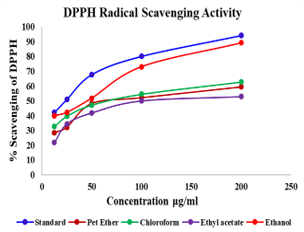Abstract
Many diseases have become easier to diagnose and treat as a result of advancements in medical science and technology, but strokes, which have multiple etiologies and mechanisms, continue to be difficult to treat. Synthetic drugs are notorious for causing a slew of unavoidable side effects. Herbal drugs have a wide range of mechanisms of action and are typically free of side effects, making them excellent alternatives to synthetic drugs for stroke treatment. Cyclea peltata (Lam) Hook f. Thoms roots were studied for their neuroprotective properties against fluoride-induced neurodegeneration in rats. The rat brain homogenate was investigated for the levels of non-enzymatic antioxidants like norepinephrine and serotonin to analyse the health of the brain. Both the hormones norepinephrine and serotonin levels were restored due to the treatment with ethanol extract of the plant. The antioxidant enzyme levels like SOD, CAT, GSH and GPx in the rat brain were estimated, and the results were similar to the non-enzymatic levels. The elevation of antioxidant enzymes indicates that the extract had an antioxidant mechanism that is responsible to help in the prevention of neurodegeneration of rats. In the brain tissues treated with Cyclea peltata extract, there was a significant increase in antioxidant enzymes and a reduction in lipid peroxidation, confirming the antioxidant mechanisms responsible for stroke prevention in extract-treated groups. The root extract of Cyclea peltata was found to show a reasonable inhibitory effect on neurodegeneration when delivered at a dose of 200mg/kg.
Full text article
Authors

This work is licensed under a Creative Commons Attribution-NonCommercial-NoDerivatives 4.0 International License.

